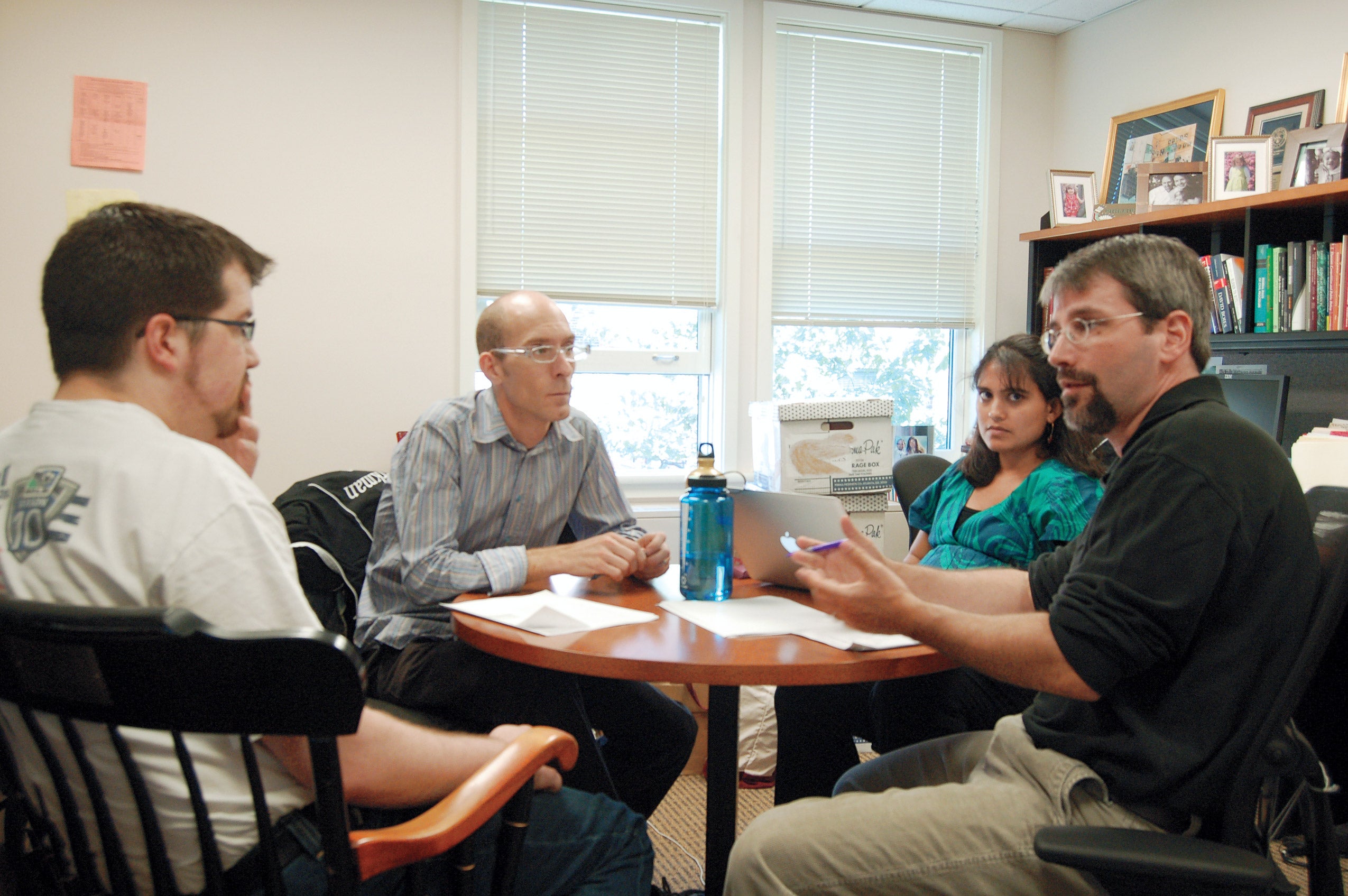With a cluster of research programs, HLS is a collection of think tanks rolled into one
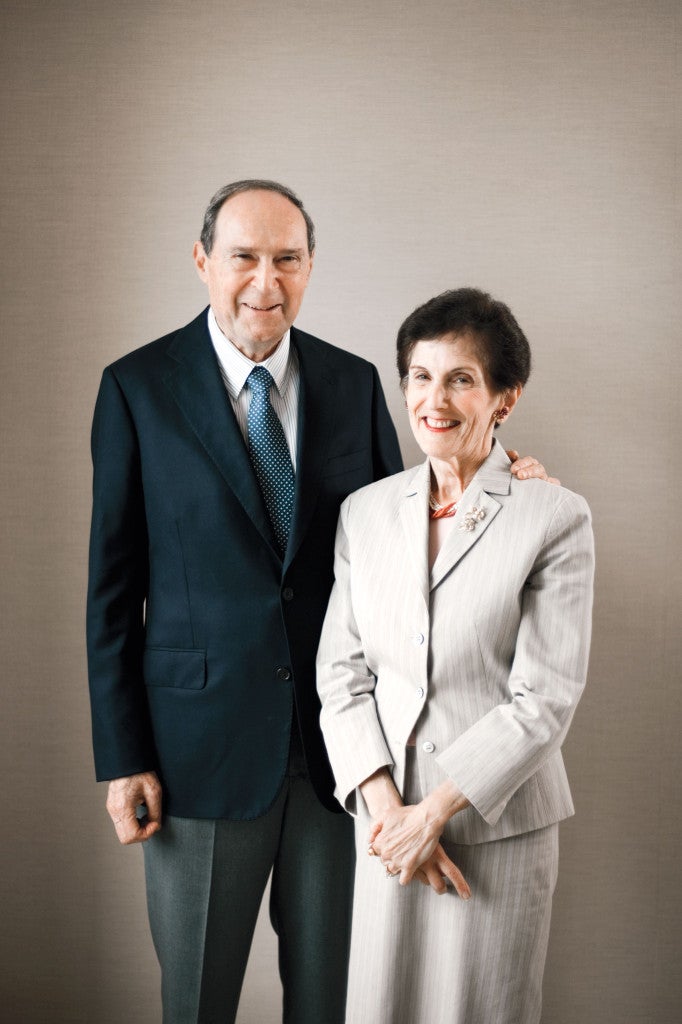
Rita Hauser ’58 has been passionately dedicated to human rights and international conflict resolution, serving as chairwoman of the International Peace Institute board of directors, as former U.S. ambassador to the Human Rights Commission at the United Nations and most recently as a board member of the Global Humanitarian Forum, a new entity founded by Kofi Annan. One of her particular interests is the area of humanitarian law, “the formal name for the laws of war,” says Hauser, president of the nonprofit Hauser Foundation, co-founded with her husband, Gus Hauser ’53, to provide support for a wide range of humanitarian causes.
“I’ve always been interested in the Geneva Conventions,” says Hauser, “as war is the most inhumane of any activity man has conceived … whatever the reason.” Humanitarian law “attempts to make something inhumane a little more humane.”
It is this interest in human rights and the laws of war that inspires the Hausers in their ongoing support of the HLS Human Rights Program. Over the past two years, a clinical project at the law school funded by the Hausers and other donors has focused on the issue of cluster munitions—large bombs that spread many smaller bombs over broad areas—which often fail to explode on impact, remaining dangerous for years to come.
Under the guidance of Clinical Instructor Bonnie Docherty ’01, HLS students in the International Human Rights Clinic have worked to secure the passage of the treaty that bans these munitions. They have conducted field research in Israel and Lebanon, attended treaty negotiations in New Zealand and Austria, and were in Dublin, Ireland, on May 30, when more than 100 states finalized the language of the treaty, which is expected to be formally ratified in December in Oslo, Norway. The students also drafted memos, jointly published with Human Rights Watch, that focused on key parts of the ban, and their contribution was critical in one important respect, says Docherty: They helped preserve a provision that would require nations to find and eliminate the cluster munitions that they have dispersed in the past.
Of course, global travel for these clinical students and Docherty is not cheap. The Hausers, who previously endowed a chair for the Human Rights Program, made a significant grant toward general programming, which has supported the cluster munitions project and many other initiatives.
“Traveling to the negotiating conferences would not have been possible without such support,” says Docherty. “What the students helped produce is groundbreaking for the humanitarian effect it will have and also sets a precedent for future international law, particularly in the area of weapons treaties.”
Throughout HLS, there are myriad exciting projects under way in other research and clinical programs, and, like the Hausers, there are many other donors whose generosity has been critical in supporting the work of students and faculty. Below, a few examples are highlighted as representative of the many.
The Petrie-Flom Center for Health Law Policy, Biotechnology, and Bioethics was founded in 2005 with a generous gift from Joseph H. Flom ’48 and the Petrie Foundation to address the lack of attention to these areas within the legal academy. Its goal is to bring together leaders from different disciplines to address health law and biotechnology, in part through conferences and workshops at the law school. In June, the center put on a conference to address problems in the U.S. health care system, drawing 25 of the nation’s leading specialists in health care, economics, business and law, as well as leaders in the insurance and hospital industries.
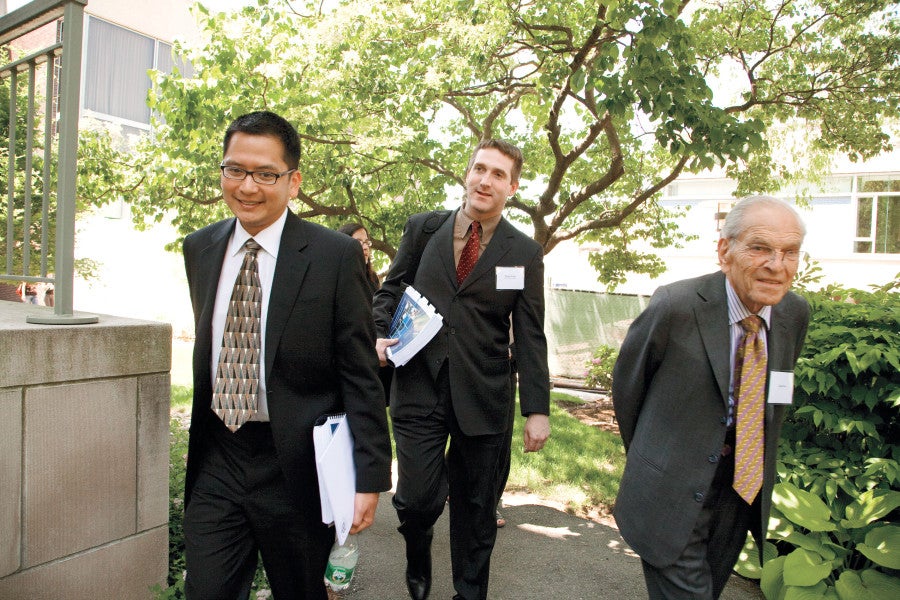
“I was there because I wanted to see how the center was progressing,” says Flom, one of the nation’s most respected and successful corporate attorneys, a senior partner at Skadden, Arps, Slate, Meagher & Flom, and a member of the HLS Campaign Executive Committee. During the conference, in discussions with the Petrie-Flom Fellows and others, “I found [the center] is exceeding my expectations,” says Flom. What does he hope for the future? “More of the same.”
Einer R. Elhauge ’86, the Carroll and Milton Petrie Professor of Law at HLS and director of the Petrie-Flom Center, is delighted by Flom’s participation. “The generous support of Mr. Flom is invaluable to the work of the Petrie-Flom Center,” says Elhauge. “We are also honored by his ongoing interest in the research and programs of the center.”
Joseph LaNasa ’94 and his wife, Stephanie LaNasa, represent the new, younger generation of significant donors to HLS, and they have focused their support on the HLS Environmental Law Program, founded and launched last year under the direction of Professor Jody Freeman LL.M. ’91 S.J.D. ’95. Joseph “Jody” LaNasa, who founded New York-based hedge fund Serengeti Asset Management, explains the thinking behind their support. “I love Harvard Law School and everything it has done for me,” LaNasa says. “And my wife is an environmentalist, so it seemed like the perfect way to support a program that meant something to both of us. Once we met Jody Freeman and saw her passion, energy, and commitment to educating and empowering the next generation of leaders, it was an easy decision.”
He adds, “As someone who has started businesses, I understand how much goes into starting something from scratch. I can relate to the challenges Jody Freeman has faced throughout this process, from selling her idea to the school and potential supporters, to launching the program and now seeing it grow and evolve.”
Currently, Assistant Clinical Professor Wendy Jacobs ’81 is leading a group of students in the Environmental Law and Policy Clinic as they assist the secretary of the Department of Health and Environment in Kansas with a novel and precedent-setting lawsuit related to global warming. The project was initiated by Jacobs, who offered to help the Kansas official fend off lawsuits challenging his denial of an application for a permit to build two coal-fired power plants because of their carbon emission impact. The permit denial was the first of its kind in the country and was highly controversial, and a team of students has been working on the case since December 2007, assisting with every aspect of the litigation and administrative hearings, including the filing of two briefs in the Kansas Supreme Court. They have landed a number of victories along the way, but the hard-fought case is ongoing, and, says Jacobs, the clinic “will continue to represent the Kansas Department of Health and Environment and support the secretary’s denial of the permit.”
Jody LaNasa says, “We love hearing about how the students have gone out and gotten involved in landmark court cases by offering to provide gratis legal advice to governments and companies that cannot afford to defend themselves against the challenges they are facing from better-funded, big-business interests which are often not taking a position that takes into account environmental impact.”
Cutting-edge legal work is also under way at the Berkman Center for Internet & Society, which was founded in 1997 with a generous gift from Jack N. (’29) and Lillian R. Berkman and continues to benefit from the support of their son, Myles Berkman ’61. The center was also the recipient of an institutional grant from the John D. and Catherine T. MacArthur Foundation and has received additional support from numerous technology- and Internet-related companies, including Google, Lenovo, Microsoft and many others. (It does not accept gifts that seek to influence its research and mission.)
One of the Berkman Center’s current projects is its Citizen Media Law Project’s Legal Guide—a free, online guide to assist bloggers, Web site operators and other citizen media creators in understanding defamation, privacy, access to government information, and other legal issues that journalists—traditional or not—may encounter in publishing online. The legal guide was funded by a grant from the John S. and James L. Knight Foundation (www.citmedialaw.org/legal-guide).
“Because many online publishers don’t have a background in media law, we have tried to make the guide as approachable as possible and included dozens of practical tips for avoiding legal liability,” said David Ardia LL.M. ’07, director and co-founder of the CMLP.
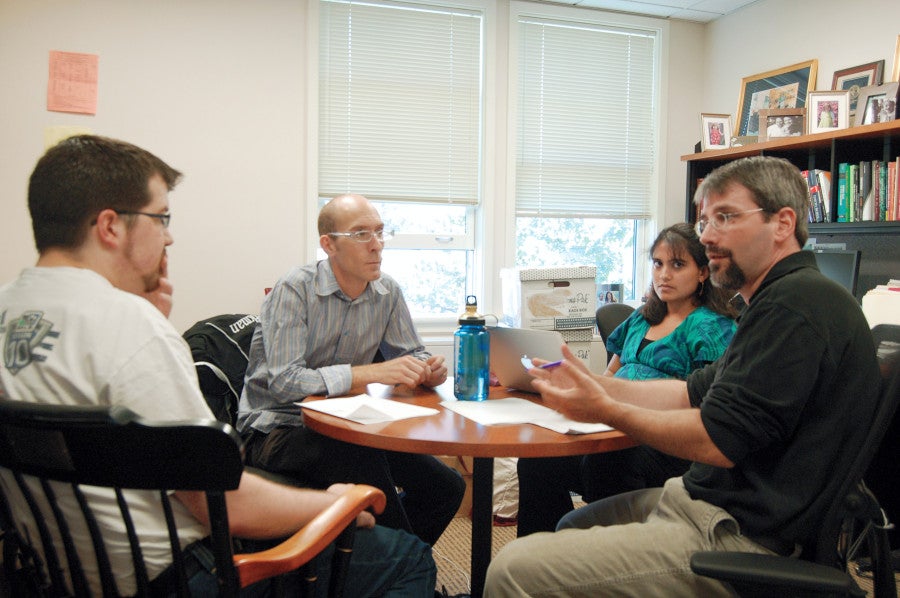
Phillip R. Malone, an HLS clinical professor of law and co-director of the cyberlaw clinic at Berkman, adds, “Without the support of the Knight Foundation, we would never have been able to launch this project, which we think will help untold numbers of bloggers and publishers of citizen media, as well as traditional journalists.”
As HLS continues the reinvention of its curriculum, including adding the study of real-world problems from legal practice, the school’s Program on the Legal Profession is providing some key support. The program’s case study project is developing study materials based on actual examples from various legal settings, to help students develop problem-solving skills for situations that lawyers are likely to encounter in practice. This method will be integral to the required problem-solving course for 1Ls to be launched this winter at HLS, and other courses already are using it, including the Professional Services course taught by Ashish Nanda, professor of practice and PLP research director. David Wilkins ’80, professor of law and faculty director of PLP, too, is using the case study method in a seminar.
One of the case studies currently being developed for his Professional Services course, Nanda says, is titled “A Tale of Three Teams.” It is designed to help students deal effectively with real-world dynamics, including: team leaders who can’t say no to unreasonable demands from clients; inadequate feedback and performance evaluation; issues surrounding time management and priority-setting; and efforts to persuade team leaders to recognize and deal with underperforming members. Nanda, formerly on the Harvard Business School faculty, says the lessons are applicable not just to law firm team dynamics, but also to those in other private- and public-sector environments.
“The case study approach captures elements of real-life decision-making that are important for effective practitioners,” says Nanda. “The cases expose participants to real-life situations with the objective that they will not only apply conceptual principles to the issues at hand but also address questions of implementation. Our goal in these case studies is to bring participants close to the practice of law.”
Although Nanda says the case study approach is an “extremely powerful” means of bringing students closer to the world of practice, it is also expensive, which is one reason why the program is so grateful for the support of its donors. “We have to go into the field, interview busy professionals, develop materials and get their input during the case development process,” he says. “The entire process is labor-intensive, so there are significant costs to developing case studies. Although they are more than covered in terms of value of learning, the costs have to be borne up front nevertheless.”
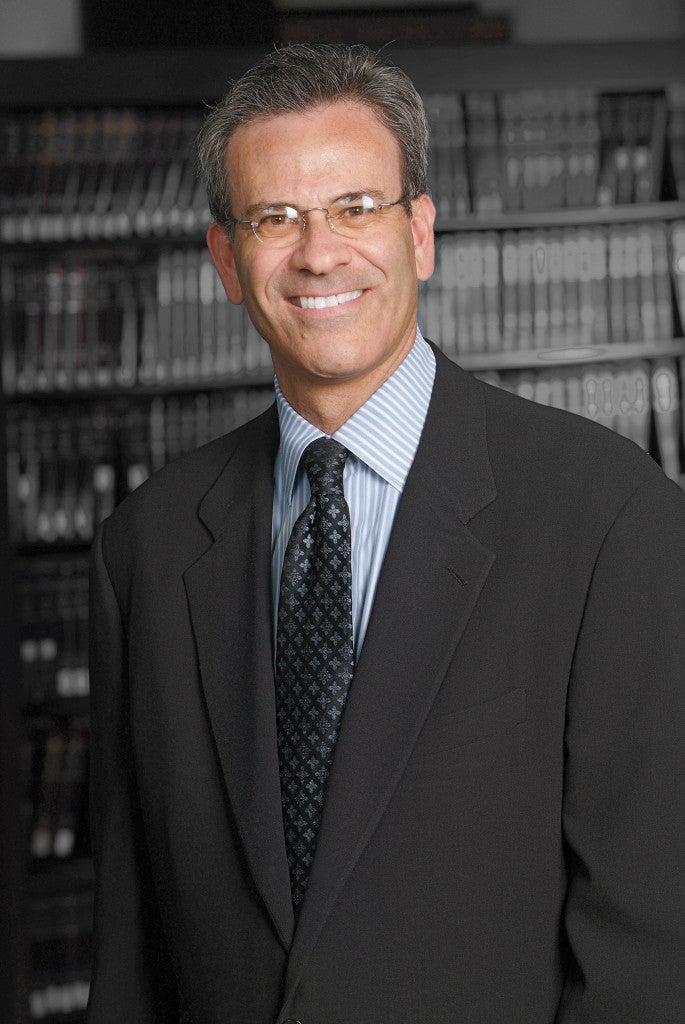
Robert Shuftan ’79, managing partner at Chicago’s Wildman Harrold, has known Wilkins since they were law students and respects his vision for the PLP generally. “The depth of the analysis related to important ongoing research projects on the legal industry, together with the opportunity to have input on those projects, attracted me to become a member of the board and to further support the program,” says Shuftan.
Shuftan had heard for years about Nanda’s program at HBS and so decided to enroll in the inaugural class of the PLP’s Leadership in Law Firms Program in 2007. He found it so valuable that he plans to send other leaders from his firm. “Ashish Nanda is a tremendous resource,” says Shuftan, adding that the program’s research projects, including the “After the J.D.” surveys and other studies, are of tremendous interest to lawyers in leadership positions.
*The title of the 2006 book by HLS Professor Cass R. Sunstein ’78, describing how the efforts of many people coming together can help societies amass bodies of accurate knowledge. Sunstein is the director of the Program on Risk Regulation—the newest of the law school’s research programs.
